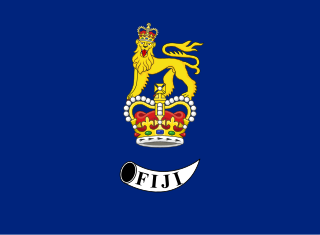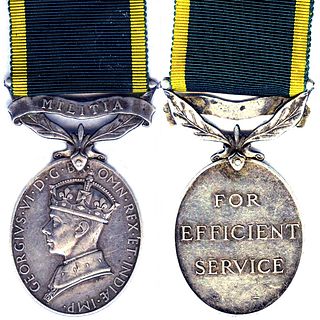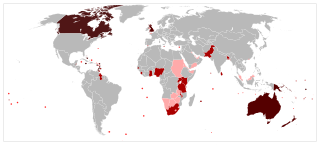
The Royal Victorian Order is a dynastic order of knighthood established in 1896 by Queen Victoria. It recognises distinguished personal service to the monarch of the Commonwealth realms, members of the monarch's family, or to any viceroy or senior representative of the monarch. The present monarch, Queen Elizabeth II, is the sovereign of the order, the order's motto is Victoria, and its official day is 20 June. The order's chapel is the Savoy Chapel in London.

The national flag of Fiji was adopted on 10 October 1970. The state arms have been slightly modified but the flag has remained the same as during Fiji's colonial period. It is a defaced sky-blue "Blue Ensign". It has remained unchanged since Fiji was declared a republic in 1987, despite calls from some politicians for changes.

Fiji became a British Crown Colony in 1874, and an independent Dominion in the Commonwealth in 1970. Queen Elizabeth II remained the Head of State, holding the title of Queen of Fiji until 1987, when she formally abdicated following two military coups. From 1874 to 1987 the Monarch's functions were exercised in Fiji by his or her representative, the Governor, and, following independence, by the Governor-General.

The flag of Rhodesia changed with political changes in the country. At independence in 1965 the recently adopted flag of Southern Rhodesia was used, until a new flag was adopted in 1968. The 1968 flag remained the flag when the republic was declared in 1970.

The Queen Elizabeth II Golden Jubilee Medal or the Queen's Golden Jubilee Medal was a commemorative medal created in 2002 to mark the fiftieth anniversary of Elizabeth II's accession. The Queen Elizabeth II Golden Jubilee Medal was awarded in Canada to nominees who contributed to public life. The Queen's Golden Jubilee Medal was awarded to active personnel in the British Armed Forces and Emergency Personnel who had completed 5 years of qualifying service.

The Queen Elizabeth II Silver Jubilee Medal was a commemorative medal created in 1977 to mark the twenty-fifth anniversary of Elizabeth II's accession in the United Kingdom, Canada, Australia, and New Zealand. The medal was physically identical in all realms where it was awarded, save for Canada, where it contained unique elements. As an internationally distributed award, the Queen Elizabeth II Silver Jubilee Medal holds a different place in each country's order of precedence for honours.
The Fijian honours system dates from the granting of dominion status in 1970, when the Fijian Independence Medal was awarded to participants in the Fijian independence celebrations. Prior to two military coups, which deposed Elizabeth II as Queen of Fiji, ending the Fijian Monarchy, Fiji also had use of the British Honours System.

The Dominion of Fiji was the official name of Fiji between October 1970 and 6 October 1987. When British rule ended in 1970, the Fijian Islands were given independence as a Dominion, in which the British monarch, Elizabeth II, remained head of state as Queen of Fiji, represented by the Governor-General. The Republic of Fiji, removing Queen Elizabeth II as head of state, was proclaimed on 6 October 1987 after two military coups.

The monarchy of Fiji arose in the mid-nineteenth century when native ruler Seru Epenisa Cakobau consolidated control of the Fijian Islands and declared himself King or paramount chief of Fiji. In 1874, he voluntarily ceded sovereignty of the islands to Britain, which made Fiji a Crown colony within the British Empire. After nearly a century of British rule, Fiji became a Dominion, an independent sovereign state within the Commonwealth of Nations with Elizabeth II as head of state. After a second military coup in 1987, Fiji became a republic, and the monarchy was ended. Nevertheless, the Great Council of Chiefs recognised Elizabeth II as Tui Viti or the traditional Queen of Fiji, but the position is not one of a constitutional, or otherwise legal nature. The Great Council of Chiefs was disestablished in 2012 by decree. Elizabeth II does not use the title, and the Fijian government does not recognise it.
South African orders, decorations and medals are those military and civilian orders, decorations and medals issued by the Government of South Africa. The following is a (non-exhaustive) list of these:

The Malaysian Service Medal is a medal given by the King and Government of Malaysia. Established 3 March 2004, the medal recognizes service by members of the Malaysian Armed Forces during the Malayan Emergency, Second Malayan Emergency, and the Indonesia–Malaysia confrontation. The medal was also offered for award to members of the Commonwealth forces from Australia, Fiji, India, Nepal, New Zealand, and the United Kingdom who served in Malaysia during the Malayan Emergency and the Indonesia–Malaysia confrontation. The award is in recognition of "distinguished chivalry, gallantry, sacrifice, or loyalty" in contributing to the freedom of independence of Malaysia. The medal can be conferred and accepted posthumously by next of kin.

The Vietnam Medal was a joint Australian and New Zealand campaign medal awarded for service in the Vietnam War.

The Rhodesia Medal was initiated by the British Government in consultation with Australia, New Zealand, Fiji and Kenya, whose forces took part in Operation AGILA,. The role of the multi-national force was to keep peace between 22,000 guerrilla fighters and the Rhodesian forces during the ceasefire and run-up to the 1980 elections.

The Efficiency Medal was instituted in 1930 for award to part-time warrant officers, non-commissioned officers and men after twelve years of efficient service on the active list of the Militia or the Territorial Army of the United Kingdom, or of the other Auxiliary Military Forces throughout the British Empire. At the same time a clasp was instituted for award to holders of the medal upon completion of further periods of six years of efficient service.

The number of states headed by Queen Elizabeth II has varied during her 68 years on the throne, altogether seeing her as sovereign of a total of 32 independent countries during this period. In her capacity as Queen of the United Kingdom, she is also monarch of three Crown dependencies—Guernsey, Jersey, and Man—and, in her capacity as Queen of New Zealand, she is monarch of two associated states—the Cook Islands and Niue—since they acquired this status in 1965 and 1974, respectively.

The Operational Service Medal is a campaign medal created in 2010 by the Canadian monarch-in-Council to recognize members of the Canadian Forces, allied forces, Canadian police officers, or Canadian civilians working for the Canadian Forces who had directly participated in any military campaign under Canadian or allied command. It is, within the Canadian system of honours, the lowest of the war and operational service medals.

The Queen Elizabeth II Diamond Jubilee Medal or The Queen's Diamond Jubilee Medal is a commemorative medal created in 2012 to mark the sixtieth anniversary of Elizabeth II's accession to the thrones of the Commonwealth realms. There are three versions of the medal: one issued by the United Kingdom, another by Canada, and the third for the Caribbean realms of Antigua and Barbuda, the Bahamas, Barbados, Grenada, Jamaica, Saint Kitts and Nevis, Saint Lucia, and Saint Vincent and the Grenadines. The ribbons used with the Canadian and British versions of the medal are the same, while the ribbon of the Caribbean medal differs slightly. The different iterations of the medal were presented to tens of thousands of recipients throughout the Commonwealth realms in the jubilee year.

The Operational Service Medal Iraq and Syria or Operation Shader Medal is a British armed forces campaign medal, awarded mostly to military personnel who served in the operational area of, or in support of Operation Shader. The medal was first announced by former Defence Secretary, Sir Michael Fallon on 19 September 2017. It was first awarded, to service personnel, on 18 July 2018 in London by Defence Secretary Gavin Williamson. This Operational Service Medal is the first to be awarded to individuals who served outside of the operational area, reflecting the changing nature of warfare.














